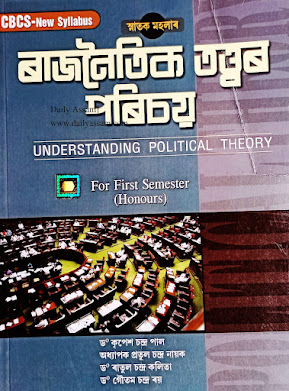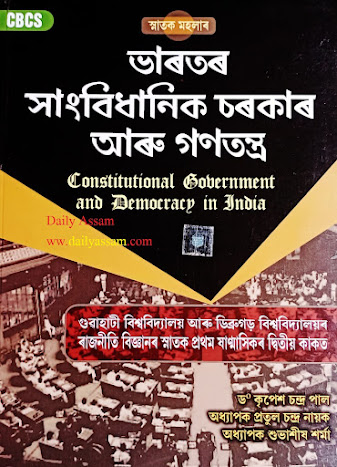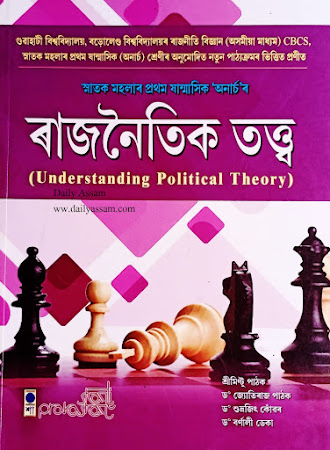NEW BOOKS
OLD BOOKS
----------------------------------------------------------------------------
Gauhati University TDC 1st Semester Political Science Major
ৰাজনীতি বিজ্ঞান স্নাতক প্ৰথম ষাণ্মাসিকৰ প্ৰশ্ন আৰু উত্তৰ
----------------------------------------------------------------------------
----------------------------------------------------------------
POL HC 1016: Understanding Political Theory
----------------------------------------------------------------
READING LIST
I: Introducing Political Theory
Bhargava, R. (2008) ‘What is Political Theory’, in Bhargava, R and Acharya, A. (eds.)
Political Theory: An Introduction. New Delhi: Pearson Longman, pp. 2-16.
Bellamy, R. (1993) ‘Introduction: The Demise and Rise of Political Theory’, in Bellamy, R.
(ed.) Theories and Concepts of Politics. New York: Manchester University Press, pp. 1-14.
Glaser, D. (1995) ‘Normative Theory’, in Marsh, D. and Stoker, G. (eds.) Theory and
Methods in Political Science. London: Macmillan, pp. 21-40.
Sanders, D. (1995) ‘Behavioral Analysis’, in Marsh, D. and Stoker, G. (eds.) Theory and
Methods in Political Science.London: Macmillan, pp. 58-75.
Chapman, J. (1995) ‘The Feminist Perspective’, in Marsh, D. and Stoker, G. (eds.) Theory
and Methods in Political Science.London: Macmillan, pp. 94-114.
Bharghava, R, ‘Why Do We Need Political Theory’, in Bhargava, R. and Acharya, A. (eds.)
Political Theory: An Introduction. New Delhi: Pearson Longman, pp. 17-36.
Bannett, J. (2004) ‘Postmodern Approach to Political Theory’, in Kukathas, Ch. and Gaus, G.
F. (eds.) Handbook of Political Theory.New Delhi: Sage, pp. 46-54.
Vincent, A. (2004) The Nature of Political Theory. New York: Oxford University Press,
2004, pp.19-80.
Mukhopadhyay, A.K. (2019), An Introduction to Political Theory, New Delhi: Sage
Publications
II: The Grammar of Democracy
Srinivasan, J. (2008) ‘Democracy’, in Bhargava, R. and Acharya, A. (eds.) Political Theory:
An Introduction. New Delhi: Pearson Longman, pp. 106-128.
Owen, D. (2003) ‘Democracy’, in Bellamy, R. and Mason, A. (eds.) Political Concepts.
Manchester and New York: Manchester University Press, pp. 105-117.
Christiano, Th. (2008) ‘Democracy’, in Mckinnon, C. (ed.) Issues in Political Theory, New
York:Oxford University Press, pp. 80-96.
Arblaster, A. (1994) Democracy. (2nd Edition). Buckingham: Open University Press.
Roy, A. ‘Citizenship’, in Bhargava, R. and Acharya, A. (eds.) Political Theory: An
Introduction.New Delhi: Pearson Longman, pp. 130-146.
Brighouse, H. (2008) ‘Citizenship’, in Mckinnon, C. (ed.) Issues in Political Theory, New
York: Oxford University Press, pp. 241-258
---------------------------------------------------------------
---------------------------------------------------------------
POL HC 1026 Constitutional Government and Democracy in India
---------------------------------------------------------------
READING LIST
I. The Constituent Assembly and the Constitution
a. Philosophy of the Constitution, the Preamble, and Features of the Constitution
Essential Readings:
G. Austin, (2010) ‘The Constituent Assembly: Microcosm in Action’, in The
IndianConstitution: Cornerstone of a Nation, New Delhi: Oxford University Press, 15th print,
pp.1-25.
R. Bhargava, (2008) ‘Introduction: Outline of a Political Theory of the Indian Constitution’,
in R. Bhargava (ed.) Politics and Ethics of the Indian Constitution, New Delhi: Oxford
University Press, pp. 1-40.
Additional Readings:
D. Basu, (2012) Introduction to the Constitution of India, New Delhi: Lexis Nexis.
S. Chaube, (2009) The Making and Working of the Indian Constitution, Delhi: National Book
Trust.
Chakrabarty, Bidyut. (2017), Indian Costitution: Text, Context and Interpretation, New Delhi,
Sage Publications
Mellalli, Praveenkumar (2015), Constitution of India, Professional Ethics and Human Rights,
New Delhi, Sage Publications
b. Fundamental Rights and Directive Principles
Essential Readings:
G. Austin, (2000) ‘The Social Revolution and the First Amendment’, in Working a
Democratic Constitution, New Delhi: Oxford University Press, pp. 69-98.
A .Sibal, (2010) ‘From Niti to Nyaya,’ Seminar, Issue 615, pp 28-34.
Chakrabarty, Bidyut. (2017), Indian Costitution: Text, Context and Interpretation, New Delhi,
Sage Publications
Mellalli, Praveenkumar (2015), Constitution of India, Professional Ethics and Human Rights,
New Delhi, Sage Publications
Additional Reading:
The Constitution of India: Bare Act with Short Notes, (2011) New Delhi: Universal, pp. 4-16.
II. Organs of Government
a. The Legislature: Parliament
Essential Readings:
B. Shankar and V. Rodrigues, (2011) ‘The Changing Conception of Representation: Issues,
Concerns and Institutions’, in The Indian Parliament: A Democracy at Work, New Delhi:
Oxford University Press, pp. 105-173.
V. Hewitt and S. Rai, (2010) ‘Parliament’, in P. Mehta and N. Jayal (eds.) The Oxford
Companion to Politics in India, New Delhi: Oxford University Press, pp. 28-42.
b. The Executive: President and Prime Minister
Essential Readings:
J. Manor, (2005) ‘The Presidency’, in D. Kapur and P. Mehta P. (eds.) Public Institutions in
India, New Delhi: Oxford University Press, pp.105-127.
J. Manor, (1994) ‘The Prime Minister and the President’, in B. Dua and J. Manor (eds.)
Nehru to the Nineties: The Changing Office of the Prime Minister in India, Vancouver:
University of British Columbia Press, pp. 20-47.
H. Khare, (2003) ‘Prime Minister and the Parliament: Redefining Accountability in the Age
of Coalition Government’, in A. Mehra and G. Kueck (eds.) The Indian Parliament: A
Comparative Perspective, New Delhi: Konark, pp. 350-368.
c. The Judiciary: Supreme Court
Essential Readings:
U. Baxi, (2010) ‘The Judiciary as a Resource for Indian Democracy’, Seminar, Issue 615, pp.
61-67.
R. Ramachandran, (2006) ‘The Supreme Court and the Basic Structure Doctrine’ in B. Kirpal
et.al (eds.) Supreme but not Infallible: Essays in Honour of the Supreme Court of India, New
Delhi: Oxford University Press, pp. 107-133.
Additional Reading:
L. Rudolph and S. Rudolph, (2008) ‘Judicial Review Versus Parliamentary Sovereignty’, in
Explaining Indian Institutions: A Fifty Year Perspective, 1956-2006: Volume 2: The Realm of
Institutions: State Formation and Institutional Change. New Delhi: Oxford University Press,
pp. 183-210.
III. Federalism and Decentralization
a. Federalism: Division of Powers, Emergency Provisions, Fifth and Sixth Schedules
Essential Readings:
M. Singh, and R. Saxena (eds.), (2011) ‘Towards Greater Federalization,’ in Indian Politics:
Constitutional Foundations and Institutional Functioning, Delhi: PHI Learning Private Ltd.,
pp.166-195.
V. Marwah, (1995) ‘Use and Abuse of Emergency Powers: The Indian Experience’, in B.
Arora and D. Verney (eds.) Multiple Identities in a Single State: Indian Federalism in a
Comparative Perspective, Delhi: Konark, pp. 136-159.
B. Sharma, (2010) ‘The 1990s: Great Expectations’; ‘The 2000s: Disillusionment
Unfathomable’, in Unbroken History of Broken Promises: Indian State and Tribal People,
Delhi: Freedom Press and Sahyog Pustak Kuteer, pp. 64-91.
The Constitution of India: Bare Act with Short Notes, (2011) New Delhi: Universal, pp 192-
213.
Additional Readings:
R. Dhavan and R. Saxena, (2006) ‘The Republic of India’, in K. Roy, C. Saunders and J.
Kincaid(eds.) A Global Dialogue on Federalism, Volume 3, Montreal: Queen’s University
Press, pp.166-197.
R. Manchanda, (2009) The No Nonsense Guide to Minority Rights in South Asia, Delhi: Sage
Publications, pp. 105-109.
b. Panchayati Raj and Municipalities
Essential Readings:
P. deSouza, (2002) ‘Decentralization and Local Government: The Second Wind of
Democracyin India’, in Z. Hasan, E. Sridharan and R. Sudarshan (eds.) India’s Living
Constitution: Ideas,Practices and Controversies, New Delhi: Permanent Black, pp. 370-404.
M. John, (2007) ‘Women in Power? Gender, Caste and Politics of Local Urban Governance’,
in Economic and Political Weekly, Vol. 42(39), pp. 3986-3993.
Raghunandan, J. R (2012) Decentralization and local governments: The Indian Experience,
Orient Black Swan, New Delhi
Baviskar, B.S and George Mathew (eds) 2009 Inclusion and Exclusion in local governance:
Field Studies from rural India, New Delhi, Sage
Chakrabarty, B. & Pandey, R.K. (2019), Local Governance in India, New Delhi, Sage
Publications.
-------------------------------------------------------------
------------------------------------------------------------------
লেখকৰ সুবিধা অনুসৰি কিতাপখনৰ প্ৰশ্ন আৰু উত্তৰ দিয়া হোৱা নাই । যদি প্ৰশ্ন আৰু উত্তৰ লাগে আমাৰ MODEL BOOKS CILCK কৰক MODEL BOOKS

.jpg)




